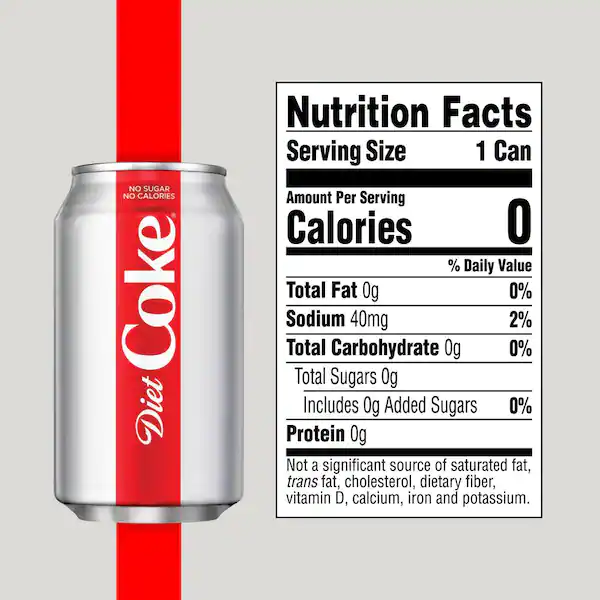Diet Coke, a popular sugar-free soft drink, has become a beverage of choice for individuals aiming to reduce calorie intake or manage their weight. To make informed choices about its consumption, it’s crucial to understand the Diet Coke nutrition facts listed on its label. In this comprehensive overview, we break down the Diet Coke nutrition facts in detail. Without further wasting time, let’s get into this.
Don’t Miss: Coke Zero Vs Diet Coke: Know The Real Differences!

Serving Size and Calories
The serving size for Diet Coke is typically listed as one can, which is 12 fluid ounces (355 milliliters). Diet Coke is known for its zero-calorie content, making it a low-energy beverage suitable for those watching their calorie intake or aiming for weight management.

Total Fat
Diet Coke contains negligible amounts of total fat. The fat content is usually listed as 0 grams per serving. The absence of fat contributes to the beverage’s low-calorie profile.
Sodium
One of the crucial Diet Coke nutrition facts is its low sodium content. Sodium content is listed in milligrams per serving. Diet Coke typically contains a small amount of sodium, often ranging from 30 to 50 milligrams per serving. The low sodium content makes Diet Coke a suitable choice for individuals aiming to moderate their salt intake.
Total Carbohydrates
The total carbohydrate content is crucial for individuals monitoring their carb intake, such as those managing diabetes. Diet Coke typically contains 0 grams of carbohydrates per serving. The absence of carbohydrates is a key feature, especially for individuals following low-carb diets or those seeking a beverage without added sugars.
Dietary Fiber
Diet Coke is not a significant source of dietary fiber, and the fiber content is typically listed as 0 grams per serving. While fiber is essential for digestive health, it is not expected in beverages like Diet Coke, which are primarily consumed for taste and refreshment.
Total Sugars
Diet Coke is marketed as a sugar-free beverage, and the total sugar content is listed as 0 grams per serving. The absence of sugar is a fundamental aspect of Diet Coke’s appeal to those looking to reduce sugar intake and manage overall calorie consumption. Thus, its another amazing fact among all the Diet Coke nutrition facts.
Protein
The protein content in Diet Coke is minimal, with 0 grams listed per serving. Beverages like Diet Coke are not intended to be significant sources of protein, and individuals should look to other food sources for meeting their protein needs.
Vitamins and Minerals
Diet Coke is not a significant source of essential vitamins or minerals. It is considered a non-nutritive beverage in terms of providing essential nutrients. Individuals should primarily rely on a varied diet of whole foods to meet their vitamin and mineral needs.
Diet Coke Ingredients

Carbonated Water
The primary ingredient in Diet Coke is carbonated water. This provides the effervescence and fizziness characteristic of sodas. Carbonated water is essentially water infused with carbon dioxide under pressure, creating bubbles when the pressure is released.
Caramel Color
Caramel color is added to Diet Coke for visual appeal, giving the beverage its characteristic dark hue. It is a common food coloring agent produced by heating sugar, and its purpose is mainly cosmetic, as it does not significantly contribute to the flavor.
Aspartame
Aspartame is a low-calorie artificial sweetener used in Diet Coke to provide sweetness without the caloric content associated with sugar. It is a combination of aspartic acid and phenylalanine, both amino acids. Aspartame is several hundred times sweeter than sucrose (table sugar), allowing for the desired sweetness without the added calories.
Phosphoric Acid
Phosphoric acid is added to Diet Coke to contribute to its tangy and acidic flavor profile. It is also found in traditional colas. The acidity enhances the overall taste of the beverage, providing a balance to the sweetness.
Potassium Benzoate (Preservative)
Potassium benzoate is a preservative used in Diet Coke to enhance its shelf life. It inhibits the growth of microorganisms and helps maintain the quality of the beverage over time.
Natural Flavors
The term “natural flavors” is a broad category that can include various extracts, essences, or compounds derived from natural sources. In Diet Coke, natural flavors are added to replicate the taste of regular cola. The specific components of these natural flavors are proprietary to The Coca-Cola Company.
Citric Acid
Citric acid is another acidulant added to Diet Coke, contributing to its overall acidity and providing a tart taste. Citric acid is a naturally occurring acid found in citrus fruits, and its inclusion helps balance the sweetness of the artificial sweeteners.
Also Read: Coke Zero Nutrition Facts: A Comprehensive Overview
Caffeine Content
Many people are concerned about the caffeine content in diet sodas. For this reason, one of the crucial Diet Coke nutrition facts is its caffeine content. Yes, Diet Coke contains caffeine, a natural stimulant that belongs to the xanthine class of compounds. The caffeine content in Diet Coke can vary, but it is typically listed as around 46 milligrams per 12-ounce serving. Caffeine is added to the beverage to provide a mild stimulant effect, contributing to increased alertness and a potential energy boost.
Conclusion: Making Informed Choices
Understanding Diet Coke nutrition facts is essential for making informed choices about its consumption. As a zero-calorie beverage, Diet Coke can be a suitable option for those looking to reduce sugar and calorie intake, manage weight, or enjoy a sugar-free alternative to traditional sodas.
It’s important to note that while Diet Coke can be part of a balanced and varied diet, prioritizing water as the main source of hydration is crucial for overall health. Additionally, individuals with specific health conditions, such as phenylketonuria (PKU) or sensitivities to artificial sweeteners, should consult healthcare professionals for personalized advice. By being aware of the nutrition facts and making mindful choices, individuals can incorporate Diet Coke into their diet while aligning with their health and wellness goals. Hopefully, you found this article on Diet Coke nutrition facts helpful enough. If you really did then let us know your unfiltered thoughts about it in the comment section down below. Thanks for visiting and appreciating our work.
